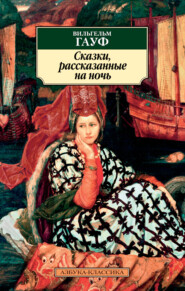По всем вопросам обращайтесь на: info@litportal.ru
(©) 2003-2025.
✖
The Oriental Story Book: A Collection of Tales
Настройки чтения
Размер шрифта
Высота строк
Поля
“Oh, dearest Princess!” exclaimed the Caliph: “tell us—when will he come, and where is the hall?”
The owl was silent a moment, and then said: “Take it not unkindly, but only on one condition can I grant your wish.”
“Speak out! speak out!” cried Chasid. “Command; whatever it may be, I am ready to obey.”
“It is this: I would fain at the same time be free; this, however, can only take place, if one of you offer me his hand.” At this proposition the storks seemed somewhat surprised, and the Caliph beckoned to his attendant to step aside with him a moment. “Grand-Vizier,” said the Caliph before the door, “this is a stupid affair, but you can set it all right.”
“Thus?” rejoined he; “that my wife, when I go home, may scratch my eyes out? Besides, I am an old man, while you are still young and unmarried, and can better give your hand to a young and beautiful princess.”
“Ah! that is the point,” sighed the Caliph, as he mournfully drooped his wings: “who told you she is young and fair? That is equivalent to buying a cat in a sack!” They continued to converse together for a long time, but finally, when the Caliph saw that Mansor would rather remain a stork than marry the owl, he determined sooner, himself, to accept the condition. The owl was overjoyed; she avowed to them that they could have come at no better time, since, probably, that very night, the sorcerers would assemble together.
She left the apartment with the storks, in order to lead them to the saloon; they went a long way through a gloomy passage, until at last a very bright light streamed upon them through a half-decayed wall. When they reached this place, the owl advised them to halt very quietly. From the breach, near which they were standing, they could look down upon a large saloon, adorned all around with pillars, and splendidly decorated, in which many colored lamps restored the light of day. In the midst of the saloon stood a round table, laden with various choice meats. Around the table extended a sofa, on which eight men were seated. In one of these men the storks recognised the very merchant, who had sold them the magic powder. His neighbor desired him to tell them his latest exploits; whereupon he related, among others, the story of the Caliph and his Vizier.
“What did you give them for a word?” inquired of him one of the other magicians.
“A right ponderous Latin one—Mutabor.”
CHAPTER V
WHEN the storks heard this through their chasm in the wall, they became almost beside themselves with joy. They ran so quickly with their long feet to the door of the ruin, that the owl could scarcely keep up with them. Thereupon spoke the Caliph to her: “Preserver of my life and that of my friend, in token of our eternal thanks for what thou hast done for us, take me as thy husband.” Then he turned to the East: three times they bowed their long necks towards the sun, which was even now rising above the mountains, and at the same moment exclaimed “Mutabor!” In a twinkling they were restored, and in the excessive joy of their newly-bestowed life, alternately laughing and weeping, were folded in each other’s arms. But who can describe their astonishment when they looked around? A beautiful woman, attired as a queen, stood before them. Smiling, she gave the Caliph her hand, and said, “Know you your screech-owl no longer?” It was she; the Caliph was in such transports at her beauty and pleasantness, as to cry out, that it was the most fortunate moment in his life, when he became a stork.
The three now proceeded together to Bagdad. The Caliph found in his dress, not only the box of magic powder, but also his money-bag. By means thereof, he purchased at the nearest village what was necessary for their journey, and accordingly they soon appeared before the gates of the city. Here, however, the arrival of the Caliph excited great astonishment. They had given out that he was dead, and the people were therefore highly rejoiced to have again their beloved lord.
So much the more, however, burned their hatred against the impostor Mizra. They proceeded to the palace, and caught the old magician and his son. The old man the Caliph sent to the same chamber in the ruin, which the princess, as a screech-owl, had inhabited, and there had him hung; unto the son, however, who understood nothing of his father’s arts, he gave his choice,—to die, or snuff some of the powder. Having chosen the latter, the Grand-Vizier presented him the box. A hearty pinch, and the magic word of the Caliph converted him into a stork. Chasid had him locked up in an iron cage, and hung in his garden.
Long and happily lived Caliph Chasid with his spouse, the Princess; his pleasantest hours were always those, when in the afternoon the Vizier sought him; and whenever the Caliph was in a very good humor, he would let himself down so far, as to show Mansor how he looked, when a stork. He would gravely march along, with rigid feet, up and down the chamber, make a clattering noise, wave his arms like wings, and show how, in vain, he had prostrated himself to the East, and cried out, Mu—mu. To the Princess and her children, this imitation always afforded great amusement: when, however, the Caliph clattered, and bowed, and cried out, too long, then the Vizier would threaten him that he would disclose to his spouse what had been proposed outside the door of the Princess Screech-owl!
When Selim Baruch had finished his story, the merchants declared themselves delighted therewith. “Verily, the afternoon has passed away from us without our having observed it!” exclaimed one of them, throwing back the covering of the tent: “the evening wind blows cool, we can still make a good distance on our journey.” To this his companions agreed; the tents were struck, and the Caravan proceeded on its way in the same order in which it had come up.
They rode almost all the night long, for it was refreshing and starry, whereas the day was sultry. At last they arrived at a convenient stopping-place; here they pitched their tents, and composed themselves to rest. To the stranger the merchants attended, as a most valued guest. One gave him cushions, a second covering, a third slaves; in a word, he was as well provided for as if he had been at home. The hottest hours of the day had already arrived, when they awoke again, and they unanimously determined to wait for evening in this place. After they had eaten together, they moved more closely to each other, and the young merchant, turning to the oldest, addressed him: “Selim Baruch yesterday made a pleasant afternoon for us; suppose Achmet, that you also tell us something, be it either from your long life, which has known so many adventures, or even a pretty Märchen.”
Upon these words Achmet was silent some time, as if he were in doubt whether to tell this or that; at last he began to speak: “Dear friends, on this our journey you have proved yourselves faithful companions, and Selim also deserves my confidence; I will therefore impart to you something of my life, of which, under other circumstances, I would speak reluctantly, and, indeed, not to any one: The History of the Spectre Ship.”
THE HISTORY OF THE SPECTRE SHIP
MY father had a little shop in Balsora; he was neither rich, nor poor, but one of those who do not like to risk any thing, through fear of losing the little that they have. He brought me up plainly, but virtuously, and soon I advanced so far, that I was able to make valuable suggestions to him in his business. When I reached my eighteenth year, in the midst of his first speculation of any importance, he died; probably through anxiety at having intrusted a thousand gold pieces to the sea. I was obliged, soon after, to deem him happy in his fortunate death, for in a few weeks the intelligence reached us, that the vessel, to which my father had committed his goods, had been wrecked. This misfortune, however, could not depress my youthful spirits. I converted all that my father had left into money, and set out to try my fortune in foreign lands, accompanied only by an old servant of the family, who, on account of ancient attachment, would not part from me and my destiny.
In the harbor of Balsora we embarked, with a favorable wind. The ship, in which I had taken passage, was bound to India. We had now for fifteen days sailed in the usual track, when the Captain predicted to us a storm. He wore a thoughtful look, for it seemed he knew that, in this place, there was not sufficient depth of water to encounter a storm with safety. He ordered them to take in all sail, and we moved along quite slowly. The night set in clear and cold, and the Captain began to think that he had been mistaken in his forebodings. All at once there floated close by ours, a ship which none of us had observed before. A wild shout and cry ascended from the deck, at which, occurring at this anxious season, before a storm, I wondered not a little. But the Captain by my side was deadly pale: “My ship is lost,” cried he; “there sails Death!” Before I could demand an explanation of these singular words, the sailors rushed in, weeping and wailing. “Have you seen it?” they exclaimed: “all is now over with us!”
But the Captain had words of consolation read to them out of the Koran, and seated himself at the helm. But in vain! The tempest began visibly to rise with a roaring noise, and, before an hour passed by, the ship struck and remained aground. The boats were lowered, and scarcely had the last sailors saved themselves, when the vessel went down before our eyes, and I was launched, a beggar, upon the sea. But our misfortune had still no end. Frightfully roared the tempest, the boat could no longer be governed. I fastened myself firmly to my old servant, and we mutually promised not to be separated from each other. At last the day broke, but, with the first glance of the morning-red, the wind struck and upset the boat in which we were seated. After that I saw my shipmates no more. The shock deprived me of consciousness, and when I returned to my senses, I found myself in the arms of my old faithful attendant, who had saved himself on the boat which had been upturned, and had come in search of me. The storm had abated; of our vessel there was nothing any more to be seen, but we plainly descried, at no great distance from us, another ship, towards which the waves were driving us. As we approached, I recognised the vessel as the same which had passed by us in the night, and which had thrown the Captain into such consternation. I felt a strange horror of this ship; the intimation of the Captain, which had been so fearfully corroborated, the desolate appearance of the ship, on which, although as we drew near we uttered loud cries, no one was visible, alarmed me. Nevertheless this was our only expedient; accordingly, we praised the Prophet, who had so miraculously preserved us.
From the fore-part of the ship hung down a long cable; for the purpose of laying hold of this, we paddled with our hands and feet. At last we were successful. Loudly I raised my voice, but all remained quiet as ever, on board the vessel. Then we climbed up by the rope, I, as the youngest, taking the lead. But horror! what a spectacle was there presented to my eye, as I stepped upon the deck! The floor was red with blood; upon it lay twenty or thirty corpses in Turkish costume; by the middle-mast stood a man richly attired, with sabre in hand—but his face was wan and distorted; through his forehead passed a large spike which fastened him to the mast—he was dead! Terror chained my feet; I dared hardly to breathe. At last my companion stood by my side; he, too, was overpowered at sight of the deck which exhibited no living thing, but only so many frightful corpses. After having, in the anguish of our souls, supplicated the Prophet, we ventured to move forward. At every step we looked around to see if something new, something still more horrible, would not present itself. But all remained as it was—far and wide, no living thing but ourselves, and the ocean-world. Not once did we dare to speak aloud, through fear that the dead Captain there nailed to the mast would bend his rigid eyes upon us, or lest one of the corpses should turn his head. At last we arrived at a staircase, which led into the hold. There involuntarily we came to a halt, and looked at each other, for neither of us exactly ventured to express his thoughts.
“Master,” said my faithful servant, “something awful has happened here. Nevertheless, even if the ship down there below is full of murderers, still would I rather submit myself to their mercy or cruelty, than spend a longer time among these dead bodies.” I agreed with him, and so we took heart, and descended, full of apprehension. But the stillness of death prevailed here also, and there was no sound save that of our steps upon the stairs. We stood before the door of the cabin; I applied my ear, and listened—there was nothing to be heard. I opened it. The room presented a confused appearance; clothes, weapons, and other articles, lay disordered together. The crew, or at least the Captain, must shortly before have been carousing, for the remains of a banquet lay scattered around. We went on from room to room, from chamber to chamber finding, in all, royal stores of silk, pearls, and other costly articles. I was beside myself with joy at the sight, for as there was no one on the ship, I thought I could appropriate all to myself; but Ibrahim thereupon called to my notice that we were still far from land, at which we could not arrive, alone and without human help.
We refreshed ourselves with the meats and drink, which we found in rich profusion, and at last ascended upon deck. But here again we shivered at the awful sight of the bodies. We determined to free ourselves therefrom, by throwing them overboard; but how were we startled to find, that no one could move them from their places! So firmly were they fastened to the floor, that to remove them one would have had to take up the planks of the deck, for which tools were wanting to us. The Captain, moreover, could not be loosened from the mast, nor could we even wrest the sabre from his rigid hand. We passed the day in sorrowful reflection on our condition; and, when night began to draw near, I gave permission to the old Ibrahim to lie down to sleep, while I would watch upon the deck, to look out for means of deliverance. When, however, the moon shone forth, and by the stars I calculated that it was about the eleventh hour, sleep so irresistibly overpowered me that I fell back, involuntarily, behind a cask which stood upon the deck. It was rather lethargy than sleep, for I plainly heard the sea beat against the side of the vessel, and the sails creak and whistle in the wind. All at once I thought I heard voices, and the steps of men upon the deck. I wished to arise and see what it was, but a strange power fettered my limbs, and I could not once open my eyes. But still more distinct became the voices; it appeared to me as if a merry crew were moving around upon the deck. In the midst of this I thought I distinguished the powerful voice of a commander, followed by the noise of ropes and sails. Gradually my senses left me; I fell into a deep slumber, in which I still seemed to hear the din of weapons, and awoke only when the sun was high in the heavens, and sent down his burning rays upon my face. Full of wonder, I gazed about me; storm, ship, the bodies, and all that I had heard in the night, recurred to me as a dream; but when I looked around, I found all as it had been the day before. Immoveable lay the bodies, immoveably was the Captain fastened to the mast; I laughed at my dream, and proceeded in search of my old companion.
The latter was seated in sorrowful meditation in the cabin. “O master,” he exclaimed as I entered, “rather would I lie in the deepest bottom of the sea, than pass another night in this enchanted ship.” I asked him the reason of his grief, and thus he answered me:—
“When I had slept an hour, I awoke, and heard the noise of walking to and fro over my head. I thought at first that it was you, but there were at least twenty running around; I also heard conversation and cries. At length came heavy steps upon the stairs. After this I was no longer conscious; but at times my recollection returned for a moment, and then I saw the same man who is nailed to the mast, sit down at that table, singing and drinking; and he who lies not far from him on the floor, in a scarlet cloak, sat near him, and helped him to drink.” Thus spoke my old servant to me.
You may believe me, my friends, that all was not right to my mind; for there was no delusion—I too had plainly heard the dead. To sail in such company was to me horrible; my Ibrahim, however, was again absorbed in deep reflection. “I have it now!” he exclaimed at length; there occurred to him, namely, a little verse, which his grandfather, a man of experience and travel, had taught him, and which could give assistance against every ghost and spectre. He also maintained that we could, the next night, prevent the unnatural sleep which had come upon us, by repeating right fervently sentences out of the Koran.
The proposition of the old man pleased me well. In anxious expectation we saw the night set in. Near the cabin was a little room, to which we determined to retire. We bored several holes in the door, large enough to give us a view of the whole cabin; then we shut it as firmly as we could from within, and Ibrahim wrote the name of the Prophet in all four corners of the room. Thus we awaited the terrors of the night.
It might again have been about the eleventh hour, when a strong inclination for sleep began to overpower me. My companion, thereupon, advised me to repeat some sentences from the Koran, which assisted me to retain my consciousness. All at once it seemed to become lively overhead; the ropes creaked, there were steps upon the deck, and several voices were plainly distinguishable. We remained, a few moments, in intense anxiety; then we heard something descending the cabin stairs. When the old man became aware of this, he began to repeat the words which his grandfather had taught him to use against spirits and witchcraft:
“Come you, from the air descending,
Rise you from the deep sea-cave,
Spring you forth where flames are blending,
Glide you in the dismal grave:
Allah reigns, let all adore him!
Own him, spirits—bow before him!”
I must confess I did not put much faith in this verse, and my hair stood on end when the door flew open. The same large, stately man entered, whom I had seen nailed to the mast. The spike still passed through the middle of his brain, but he had sheathed his sword. Behind him entered another, attired with less magnificence, whom also I had seen lying on the deck. The Captain, for he was unquestionably of this rank, had a pale countenance, a large black beard, and wildly-rolling eyes, with which he surveyed the whole apartment. I could see him distinctly, for he moved over opposite to us; but he appeared not to observe the door which concealed us. The two seated themselves at the table, which stood in the centre of the cabin, and spoke loud and fast, shouting together in an unknown tongue. They continually became more noisy and earnest, until at length, with doubled fist, the Captain brought the table a blow which shook the whole apartment. With wild laughter the other sprang up, and beckoned to the Captain to follow him. The latter rose, drew his sabre, and then both left the apartment. We breathed more freely when they were away; but our anxiety had still for a long time no end. Louder and louder became the noise upon deck; we heard hasty running to and fro, shouting, laughing, and howling. At length there came an actually hellish sound, so that we thought the deck and all the sails would fall down upon us, the clash of arms, and shrieks—of a sudden all was deep silence. When, after many hours, we ventured to go forth, we found every thing as before; not one lay differently—all were as stiff as wooden figures.
Thus passed we several days on the vessel; it moved continually towards the East, in which direction, according to my calculation, lay the land; but if by day it made many miles, by night it appeared to go back again, for we always found ourselves in the same spot when the sun went down. We could explain this in no other way, than that the dead men every night sailed back again with a full breeze. In order to prevent this, we took in all the sail before it became night, and employed the same means as at the door in the cabin; we wrote on parchment the name of the Prophet, and also, in addition, the little stanza of the grandfather, and bound them upon the furled sail. Anxiously we awaited the result in our chamber. The ghosts appeared this time not to rage so wickedly; and, mark, the next morning the sails were still rolled up as we had left them. During the day we extended only as much as was necessary to bear the ship gently along, and so in five days we made considerable headway.
At last, on the morning of the sixth day, we espied land at a short distance, and thanked Allah and his Prophet for our wonderful deliverance. This day and the following night we sailed along the coast, and on the seventh morning thought we discovered a city at no great distance: with a good deal of trouble we cast an anchor into the sea, which soon reached the bottom; then launching a boat which stood upon the deck, we rowed with all our might towards the city. After half an hour we ran into a river that emptied into the sea, and stepped ashore. At the gate we inquired what the place was called, and learned that it was an Indian city, not far from the region to which at first I had intended to sail. We repaired to a Caravansery, and refreshed ourselves after our adventurous sail. I there inquired for a wise and intelligent man, at the same time giving the landlord to understand that I would like to have one tolerably conversant with magic. He conducted me to an unsightly house in a remote street, knocked thereat, and one let me in with the injunction that I should ask only for Muley.
In the house, came to me a little old man with grizzled beard and a long nose, to demand my business. I told him I was in search of the wise Muley; he answered me that he was the man. I then asked his advice as to what I should do to the dead bodies, and how I must handle them in order to remove them from the ship.
He answered me that the people of the ship were probably enchanted on account of a crime somewhere upon the sea: he thought the spell would be dissolved by bringing them to land, but this could be done only by taking up the planks on which they lay. In the sight of God and justice, he said that the ship, together with all the goods, belonged to me, since I had, as it were, found it; and, if I would keep it very secret, and make him a small present out of my abundance, he would assist me with his slaves to remove the bodies. I promised to reward him richly, and we set out on our expedition with five slaves, who were supplied with saws and hatchets. On the way, the magician Muley could not sufficiently praise our happy expedient of binding the sails around with the sentences from the Koran. He said this was the only means, by which we could have saved ourselves.
It was still pretty early in the day when we reached the ship. We immediately set to work, and in an hour placed four in the boat. Some of the slaves were then obliged to row to land to bury them there. They told us, when they returned, that the bodies had spared them the trouble of burying, since, the moment they laid them on the earth, they had fallen to dust. We diligently set to work to saw off the bodies, and before evening all were brought to land. There were, at last, no more on board than the one that was nailed to the mast. Vainly sought we to draw the nail out of the wood, no strength was able to start it even a hair’s-breadth. I knew not what next to do, for we could not hew down the mast in order to bring him to land; but in this dilemma Muley came to my assistance. He quickly ordered a slave to row to land and bring a pot of earth. When he had arrived with it, the magician pronounced over it some mysterious words, and cast it on the dead man’s head. Immediately the latter opened his eyes, drew a deep breath, and the wound of the nail in his forehead began to bleed. We now drew it lightly forth, and the wounded man fell into the arms of one of the slaves.
“Who bore me hither?” he exclaimed, after he seemed to have recovered himself a little. Muley made signs to me, and I stepped up to him.
“Thank thee, unknown stranger; thou hast freed me from long torment. For fifty years has my body been sailing through these waves, and my spirit was condemned to return to it every night. But now my head has come in contact with the earth, and, my crime expiated, I can go to my fathers!”
I entreated him, thereupon, to tell how he had been brought to this horrible state, and he began—
“Fifty years ago, I was an influential, distinguished man, and resided in Algiers: a passion for gain urged me on to fit out a ship, and turn pirate. I had already followed this business some time, when once, at Zante, I took on board a Dervise, who wished to travel for nothing. I and my companions were impious men, and paid no respect to the holiness of the man; I, in particular, made sport of him. When, however, on one occasion he upbraided me with holy zeal for my wicked course of life, that same evening, after I had been drinking to excess with my pilot in the cabin, anger overpowered me. Reflecting on what the Dervise had said to me, which I would not have borne from a Sultan, I rushed upon deck, and plunged my dagger into his breast. Dying, he cursed me and my crew, and doomed us not to die and not to live, until we should lay our heads upon the earth.
“The Dervise expired, and we cast him overboard, laughing at his menaces; that same night, however, were his words fulfilled. One portion of my crew rose against me; with terrible courage the struggle continued, until my supporters fell, and I myself was nailed to the mast. The mutineers, however, also sank under their wounds, and soon my ship was but one vast grave. My eyes also closed, my breath stopped—I thought I was dying. But it was only a torpor which held me chained: the following night, at the same hour in which we had cast the Dervise into the sea, I awoke, together with all my comrades; life returned, but we could do and say nothing but what had been done and said on that fatal night. Thus we sailed for fifty years, neither living nor dying, for how could we reach the land? With mad joy we ever dashed along, with full sails, before the storm, for we hoped at last to be wrecked upon some cliff, and to compose our weary heads to rest upon the bottom of the sea; but in this we never succeeded. Now I shall die! Once again, unknown preserver, accept my thanks, and if treasures can reward thee, then take my ship in token of my gratitude.”
With these words the Captain let his head drop, and expired. Like his companions, he immediately fell to dust. We collected this in a little vessel, and buried it on the shore: and I took workmen from the city to put the ship in good condition. After I had exchanged, with great advantage, the wares I had on board for others, I hired a crew, richly rewarded my friend Muley, and set sail for my fatherland. I took a circuitous route, in the course of which I landed at several islands and countries, to bring my goods to market. The Prophet blessed my undertaking. After several years I ran into Balsora, twice as rich as the dying Captain had made me. My fellow-citizens were amazed at my wealth and good fortune, and would believe nothing else but that I had found the diamond-valley of the far-famed traveller Sinbad. I left them to their belief; henceforth must the young folks of Balsora, when they have scarcely arrived at their eighteenth year, go forth into the world, like me, to seek their fortunes. I, however, live in peace and tranquillity, and every five years make a journey to Mecca, to thank the Lord for his protection, in that holy place, and to entreat for the Captain and his crew, that He will admit them into Paradise.
The march of the Caravan proceeded the next day without hinderance, and when they halted, Selim the Stranger began thus to speak to Muley, the youngest of the merchants:
“You are, indeed, the youngest of us, nevertheless you are always in fine spirits, and, to a certainty, know for us, some right merry story. Out with it then, that it may refresh us after the heat of the day.”
“I might easily tell you something,” answered Muley, “which would amuse you, nevertheless modesty becomes youth in all things; therefore must my older companions have the precedence. Zaleukos is ever so grave and reserved; should not he tell us what has made his life so serious? Perhaps we could assuage his grief, if such he have; for gladly would we serve a brother, even if he belong to another creed.”
The person alluded to was a Grecian merchant of middle age, handsome and strongly built, but very serious. Although he was an unbeliever, (that is, no Mussulman,) still his companions were much attached to him, for his whole conduct had inspired them with respect and confidence. He had only one hand, and some of his companions conjectured that, perhaps, this loss gave so grave a tone to his character. Zaleukos thus answered Muley’s friendly request:
“I am much honored by your confidence: grief have I none, at least none from which, even with your best wishes, you can relieve me. Nevertheless, since Muley appears to blame me for my seriousness, I will relate to you something which will justify me when I am more grave than others. You see that I have lost my left hand; this came not to me at my birth, but I lost it in the most unhappy days of my life. Whether I bear the fault thereof, whether I am wrong to be more serious than my condition in life would seem to make me, you must decide, when I have told you the Story of the Hewn-off Hand.”

















